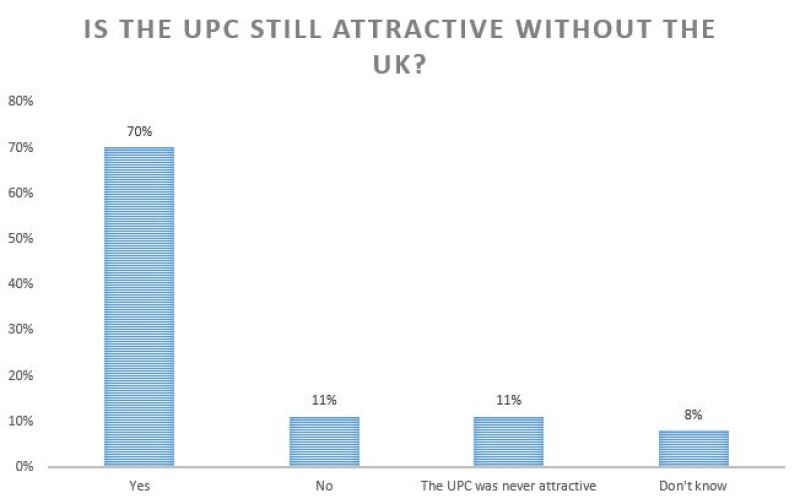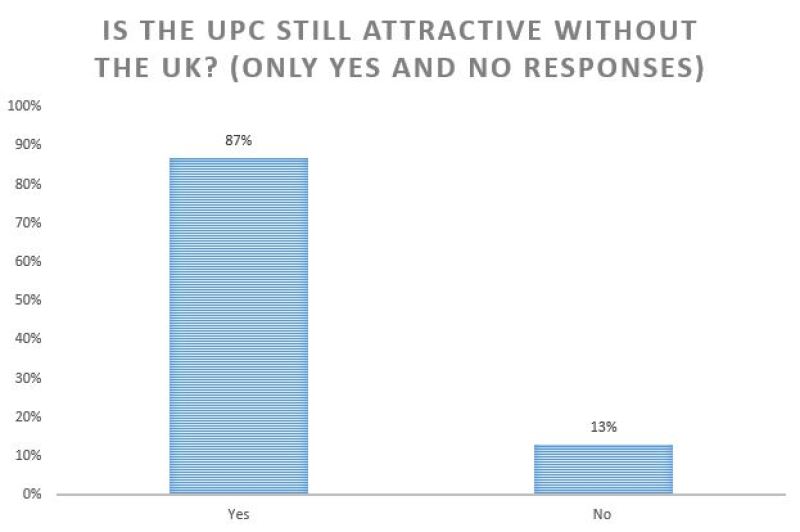Despite the UK government announcing last week that it would not seek membership of the Unified Patent Court, it seems that most businesses would still like the harmonised patent project in Europe to go ahead.
In a Managing IP survey of more than 100 in-house counsel from different jurisdictions and industries, 70% of respondents said the UPC and unitary patent system would still be attractive to them and their businesses.

When the data is filtered by ‘yes’ and ‘no’ responses to exclude respondents for whom the UPC was never attractive or who didn’t know if the system would still be desirable without the UK, more than four fifths (87%) suggested that they would like to see the system go ahead.

When asked why the UPC would or would not be attractive without the UK, many of those who said it would still be desirable reasoned that the system would still cover up to 27 EU member states, which would have obvious efficiency and cost-saving benefits.
Several survey takers added that, while the UPC is inevitably not as attractive now as it would have been with the UK and its judges involved, the opportunity to increase harmonisation and reduce uncertainty is still an attractive prospect.
“Ultimately, if an efficient patent system and court can be structured in a way that creates a common understanding and reduces uncertainty in enforceability and validity across the continent – while unfortunately without the involvement of one major economy – we should still strive to reach have that system,” says the head of patents at a car maker in the US.
The head of IP at a telecoms company in Germany says that the UK’s importance to his business has decreased tremendously since Brexit, apart from in some special business areas. Far from lamenting the loss of UK judges to the system, he believes the UPC will benefit from increased consistency.
“Without UK judges, consistency of the UPC's decision making will be rather increased. Furthermore, even if you only consider Germany, France and Italy, those countries constitute a huge market that is reached by a unitary patent, and by the related court.”
The chief IP counsel at a pharmaceutical manufacturer in the UK notes that the country is not the only important jurisdiction to large businesses.
“The world does not revolve around the UK,” he says. “UK-style patent litigation is not the be-all and end-all, and a pan-European patent prosecution and litigation system would still have some obvious attractions as compared with the current tapestry of national European patent litigation systems.”
These views fall in line with that of EPO president Antonio Campinos, who told delegates at Managing IP’s International Patent Forum yesterday that the UPC could still offer considerable reach and economic benefits to patent owners.
IP practitioners were shocked to learn last week from a government spokesperson that the UK would not seek membership of the UPC, despite the previous government having ratified the UPC Agreement (UPCA) in April 2018.
Those who still want to see the UPC go ahead are now looking to the Federal Constitutional Court to give a swift and positive ruling on UPCA constitutionality in Germany, and to European regional governments to push ahead with the harmonised patent project.
If the UPC system doesn’t go ahead, it certainly won’t be because of a lack of support among patent-focused businesses.











